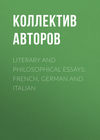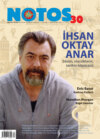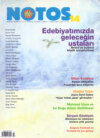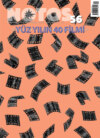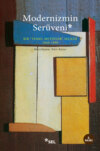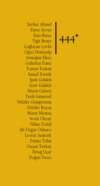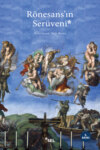Kitabı oku: «Literary and Philosophical Essays: French, German and Italian», sayfa 18
LETTER VIII
Must philosophy therefore retire from this field, disappointed in its hopes? Whilst in all other directions the dominion of forms is extended, must this the most precious of all gifts be abandoned to a formless chance? Must the contest of blind forces last eternally in the political world, and is social law never to triumph over a hating egotism?
Not in the least. It is true that reason herself will never attempt directly a struggle with this brutal force which resists her arms, and she will be as far as the son of Saturn in the 'Iliad' from descending into the dismal field of battle, to fight them in person. But she chooses the most deserving among the combatants, clothes him with divine arms as Jupiter gave them to his son-in-law, and by her triumphing force she finally decides the victory.
Reason has done all that she could in finding the law and promulgating it; it is for the energy of the will and the ardour of feeling to carry it out. To issue victoriously from her contest with force, truth herself must first become a force, and turn one of the instincts of man into her champion in the empire of phenomena. For instincts are the only motive forces in the material world. If hitherto truth has so little manifested her victorious power, this has not depended on the understanding, which could not have unveiled it, but on the heart which remained closed to it, and on instinct which did not act with it.
Whence, in fact, proceeds this general sway of prejudices, this might of the understanding in the midst of the light disseminated by philosophy and experience? The age is enlightened, that is to say, that knowledge, obtained and vulgarised, suffices to set right at least our practical principles. The spirit of free inquiry has dissipated the erroneous opinions which long barred the access to truth, and has undermined the ground on which fanaticism and deception had erected their throne. Reason has purified itself from the il lusions of the senses and from a mendacious sophistry, and philosophy herself raises her voice and exhorts us to return to the bosom of nature, to which she had first made us unfaithful. Whence then is it that we remain still barbarians?
There must be something in the spirit of man – as it is not in the objects themselves – which prevents us from receiving the truth, notwithstanding the brilliant light she diffuses, and from accepting her, whatever may be her strength for producing conviction. This something was perceived and expressed by an ancient sage in this very significant maxim: sapere aude [Footnote: Dare to be wise].
Dare to be wise! A spirited courage is required to triumph over the impediments that the indolence of nature as well as the cowardice of the heart oppose to our in struction. It was not without reason that the ancient Mythos made Minerva issue fully armed from the head of Jupiter, for it is with warfare that this instruction com mences. From its very outset it has to sustain a hard fight against the senses, which do not like to be roused from their easy slumber. The greater part of men are much too exhausted and enervated by their struggle with want to be able to engage in a new and severe contest with error. Satisfied if they themselves can escape from the hard labour of thought, they willingly abandon to others the guardianship of their thoughts. And if it happens that nobler necessities agitate their soul, they cling with a greedy faith to the formulas that the state and the church hold in reserve for such cases. If these unhappy men deserve our compassion, those others deserve our just contempt, who, though set free from those necessities by more fortunate circumstances, yet willingly bend to their yoke. These latter persons prefer this twilight of obscure ideas; where the feelings have more intensity, and the imagination can at will create convenient chimeras, to the rays of truth which put to flight the pleasant illusions of their dreams. They have founded the whole structure of their happiness on these very illusions, which ought to be combated and dissipated by the light of knowledge, and they would think they were paying too dearly for a truth which begins by robbing them of all that has value in their sight. It would be necessary that they should be already sages to love wisdom: a truth that was felt at once by him to whom philosophy owes its name. [Footnote: The Greek word means, as is known, love of wisdom.]
It is therefore not going far enough to say that the light of the understanding only deserves respect when it reacts on the character; to a certain extent it is from the character that this light proceeds; for the road that terminates in the head must pass through the heart. Accordingly, the most pressing need of the present time is to educate the sensibility, because it is the means, not only to render efficacious in practice the improvement of ideas, but to call this improvement into existence.
LETTER IX
But perhaps there is a vicious circle in our previous reasoning? Theoretical culture must it seems bring along with it practical culture, and yet the latter must be the condition of the former. All improvement in the political sphere must proceed from the ennobling of the character. But, subject to the influence of a social constitution still barbarous, how can character become ennobled? It would then be necessary to seek for this end an instrument that the state does not furnish, and to open sources that would have preserved themselves pure in the midst of political corruption.
I have now reached the point to which all the considerations tended that have engaged me up to the present time. This instrument is the art of the beautiful; these sources are open to us in its immortal models.
Art, like science, is emancipated from all that is positive, and all that is humanly conventional; both are completely independent of the arbitrary will of men. The political legislator may place their empire under an interdict, but he cannot reign there. He can proscribe the friend of truth, but truth subsists; he can degrade the artist, but he cannot change art. No doubt, nothing is more common than to see science and art bend before the spirit of the age, and creative taste receive its law from critical taste. When the character becomes stiff and hardens itself, we see science severely keeping her limits, and art subject to the harsh restraint of rules; when the character is relaxed and softened, science endeavours to please and art to rejoice. For whole ages philosophers as well as artists show themselves occupied in letting down truth and beauty to the depths of vulgar humanity. They themselves are swallowed up in it; but, thanks to their essential vigour and indestructible life, the true and the beautiful make a victorious fight, and issue triumphant from the abyss.
No doubt the artist is the child of his time, but unhappy for him if he is its disciple or even its favourite. Let a beneficent deity carry off in good time the suckling from the breast of its mother, let it nourish him on the milk of a better age, and suffer him to grow up and arrive at virility under the distant sky of Greece. When he has attained manhood, let him come back, presenting a face strange to his own age; let him come, not to delight it with his apparition, but rather to purify it, terrible as the son of Agamemnon. He will, indeed, receive his matter from the present time, but he will borrow the form from a nobler time and even beyond all time, from the essential, absolute, immutable unity. There, issuing from the pure ether of its heavenly nature, flows the source of all beauty, which was never tainted by the corruption of generations or of ages, which roll along far beneath it in dark eddies. Its matter may be dishonoured as well as ennobled by fancy, but the ever chaste form escapes from the caprices of imagination. The Roman had already bent his knee for long years to the divinity of the emperors, and yet the statues of the gods stood erect; the temples retained their sanctity for the eye long after the gods had become a theme for mockery, and the noble architecture of the palaces that shielded the infamies of Nero and of Commodus were a protest against them. Humanity has lost its dignity, but art has saved it, and preserves it in marbles full of meaning; truth continues to live in illusion, and the copy will serve to re- establish the model. If the nobility of art has survived the nobility of nature, it also goes before it like an inspiring genius, forming and awakening minds. Before truth causes her triumphant light to penetrate into the depth of the heart, poetry intercepts her rays, and the summits of humanity shine in a bright light, while a dark and humid night still hangs over the valleys.
But how will the artist avoid the corruption of his time which encloses him on all hands? Let him raise his eyes to his own dignity, and to law; let him not lower them to necessity and fortune. Equally exempt from a vain activity which would imprint its trace on the fugitive moment, and from the dreams of an impatient enthusiasm which applies the measure of the absolute to the paltry productions of time, let the artist abandon the real to the understanding, for that is its proper field. But let the artist endeavour to give birth to the ideal by the union of the possible and of the necessary. Let him stamp illusion and truth with the effigy of this ideal; let him apply it to the play of his imagination and his most serious actions, in short, to all sensuous and spiritual forms; then let him quietly launch his work into infinite time.
But the minds set on fire by this ideal have not all received an equal share of calm from the creative genius – that great and patient temper which is required to impress the ideal on the dumb marble, or to spread it over a page of cold, sober letters, and then entrust it to the faithful hands of time. This divine instinct, and creative force, much too ardent to follow this peaceful walk, often throws itself immediately on the present, on active life, and strives to transform the shapeless matter of the moral world. The misfortune of his brothers, of the whole species, appeals loudly to the heart of the man of feeling; their abasement appeals still louder; enthusiasm is inflamed, and in souls endowed with energy the burning desire aspires impatiently to action and facts. But has this innovator examined himself to see if these disorders of the moral world wound his reason, or if they do not rather wound his self-love? If he does not determine this point at once, he will find it from the impulsiveness with which he pursues a prompt and definite end. A pure, moral motive has for its end the absolute; time does not exist for it, and the future becomes the present to it directly, by a necessary development, it has to issue from the present. To a reason having no limits the direction towards an end becomes confounded with the accomplishment of this end, and to enter on a course is to have finished it.
If, then, a young friend of the true and of the beautiful were to ask me how, notwithstanding the resistance of the times, he can satisfy the noble longing of his heart, I should reply: Direct the world on which you act towards that which is good, and the measured and peaceful course of time will bring about the results. You have given it this direction if by your teaching you raise its thoughts towards the necessary and the eternal; if, by your acts or your creations, you make the necessary and the eternal the object of your leanings. The structure of error and of all that is arbitrary, must fall, and it has already fallen, as soon as you are sure that it is tottering. But it is important that it should not only totter in the external but also in the internal man. Cherish triumphant truth in the modest sanctuary of your heart; give it an incarnate form through beauty, that it may not only be the understanding that does homage to it, but that feeling may lovingly grasp its appearance. And that you may not by any chance take from external reality the model which you yourself ought to furnish, do not venture into its dangerous society before you are assured in your own heart that you have a good escort furnished by ideal nature. Live with your age, but be not its creation; labour for your contemporaries, but do for them what they need, and not what they praise. Without having shared their faults, share their punishment with a noble resignation, and bend under the yoke which they find is as painful to dispense with as to bear. By the constancy with which you will despise their good fortune, you will prove to them that it is not through cowardice that you submit to their sufferings. See them in thought such as they ought to be when you must act upon them; but see them as they are when you are tempted to act for them. Seek to owe their suffrage to their dignity; but to make them happy keep an account of their unworthiness; thus, on the one hand, the nobleness of your heart will kindle theirs, and, on the other, your end will not be reduced to nothingness by their unworthiness. The gravity of your principles will keep them off from you, but in play they will still endure them. Their taste is purer than their heart, and it is by their taste you must lay hold of this suspicious fugitive. In vain will you combat their maxims, in vain will you condemn their actions; but you can try your moulding hand on their leisure. Drive away caprice, frivolity, and coarseness, from their pleasures, and you will banish them imperceptibly from their acts, and at length from their feelings. Everywhere that you meet them, surround them with great, noble, and ingenious forms; multiply around them the symbols of perfection, till appearance triumphs over reality, and art over nature.
LETTER X
Convinced by my preceding letters, you agree with me on this point, that man can depart from his destination by two opposite roads, that our epoch is actually moving on these two false roads, and that it has become the prey, in one case, of coarseness, and elsewhere of exhaustion and de pravity. It is the beautiful that must bring it back from this twofold departure. But how can the cultivation of the fine arts remedy, at the same time, these opposite defects, and unite in itself two contradictory qualities? Can it bind nature in the savage, and set it free in the barbarian? Can it at once tighten a spring and loose it, and if it cannot produce this double effect, how will it be reasonable to expect from it so important a result as the education of man?
It may be urged that it is almost a proverbial adage that the feeling developed by the beautiful refines manners, and any new proof offered on the subject would appear superfluous. Men base this maxim on daily experience, which shows us almost always clearness of intellect, deli cacy of feeling, liberality and even dignity of conduct, associated with a cultivated taste, while an uncultivated taste is almost always accompanied by the opposite qualities. With considerable assurance, the most civilised nation of antiquity is cited as an evidence of this, the Greeks, among whom the perception of the beautiful attained its highest development, and, as a contrast, it is usual to point to nations in a partial savage state, and partly barbarous, who expiate their insensibility to the beautiful by a coarse or, at all events, a hard austere character. Nevertheless, some thinkers are tempted occasionally to deny either the fact itself or to dispute the legitimacy of the consequences that are derived from it. They do not entertain so unfavourable an opinion of that savage coarseness which is made a reproach in the case of certain nations; nor do they form so advantageous an opinion of the refinement so highly lauded in the case of cultivated nations. Even as far back as in antiquity there were men who by no means regarded the culture of the liberal arts as a benefit, and who were consequently led to forbid the entrance of their republic to imagination.
I do not speak of those who calumniate art, because they have never been favoured by it. These persons only appreciate a possession by the trouble it takes to acquire it, and by the profit it brings; and how could they properly appreciate the silent labour of taste in the exterior and in terior man? How evident it is that the accidental disadvantages attending liberal culture would make them lose sight of its essential advantages! The man deficient in form despises the grace of diction as a means of corruption, courtesy in the social relations as dissimulation, delicacy and generosity in conduct as an affected exaggeration. He cannot forgive the favourite of the Graces for having enlivened all assemblies as a man of the world, of having directed all men to his views like a statesman, and of giving his impress to the whole century as a writer; while he, the victim of labour, can only obtain, with all his learning, the least attention or overcome the least difficulty. As he cannot learn from his fortunate rival the secret of pleasing, the only course open to him is to deplore the corruption of human nature, which adores rather the appearance than the reality.
But there are also opinions deserving respect, that pronounce themselves adverse to the effects of the beautiful, and find formidable arms in experience, with which to wage war against it. "We are free to admit" – such is their language – "that the charms of the beautiful can further honourable ends in pure hands; but it is not repugnant to its nature to produce, in impure hands, a directly contrary effect, and to employ in the service of injustice and error the power that throws the soul of man into chains. It is exactly because taste only attends to the form and never to the substance; it ends by placing the soul on the dangerous incline, leading it to neglect all reality and to sacrifice truth and morality to an attractive envelope. All the real difference of things vanishes, and it is only the appearance that determines their value! How many men of talent" – thus these arguers proceed – "have been turned aside from all effort by the seductive power of the beautiful, or have been led away from all serious exercise of their activity, or have been induced to use it very feebly? How many weak minds have been impelled to quarrel with the organisation of society, simply because it has pleased the imagination of poets to present the image of a world constituted differently, where no propriety chains down opinion and no artifice helds nature in thraldom? What a dangerous logic of the passions they have learned since the poets have painted them in their pictures in the most brilliant colours and since, in the contest with law and duty, they have commonly re mained masters of the battlefield. What has society gained by the relations of society, formerly under the sway of truth, being now subject to the laws of the beautiful, or by the external impression deciding the estimation in which merit is to be held? We admit that all virtues whose appearance produces an agreeable effect are now seen to flourish, and those which, in society, give a value to the man who possesses them. But, as a compensation, all kinds of excesses are seen to prevail, and all vices are in vogue that can be reconciled with a graceful exterior." It is certainly a matter entitled to reflection that, at almost all the periods of history when art flourished and taste held sway, humanity is found in a state of decline; nor can a single instance be cited of the union of a large diffusion of aesthetic culture with political liberty and social virtue, of fine manners associated with good morals, and of politeness fraternising with truth and loyalty of character and life.
As long as Athens and Sparta preserved their independence, and as long as their institutions were based on respect for the laws, taste did not reach its maturity, art remained in its infancy, and beauty was far from exer cising her empire over minds. No doubt, poetry had already taken a sublime flight, but it was on the wings of genius, and we know that genius borders very closely on savage coarseness, that it is a light which shines readily in the midst of darkness, and which therefore often argues against rather than in favour of the taste of the time. When the golden age of art appears under Pericles and Alexander, and the sway of taste becomes more general, strength and liberty have abandoned Greece; eloquence corrupts the truth, wisdom offends it on the lips of Socrates, and virtue in the life of Phocion. It is well known that the Romans had to exhaust their energies in civil wars, and, corrupted by Oriental luxury, to bow their heads under the yoke of a fortunate despot, before Grecian art triumphed over the stiffness of their character. The same was the case with the Arabs: civilisation only dawned upon them when the vigour of their military spirit became softened under the sceptre of the Abbassides. Art did not appear in modern Italy till the glorious Lombard League was dissolved, Florence submitting to the Medici, and all those brave cities gave up the spirit of independ ence for an inglorious resignation. It is almost super fluous to call to mind the example of modern nations, with whom refinement has increased in direct proportion to the decline of their liberties. Wherever we direct our eyes in past times, we see taste and freedom mutually avoiding each other. Everywhere we see that the beautiful only founds its sway on the ruins of heroic virtues.
And yet this strength of character, which is commonly sacrificed to establish aesthetic culture, is the most power ful spring of all that is great and excellent in man, and no other advantage, however great, can make up for it. Accordingly, if we only keep to the experiments hitherto made, as to the influence of the beautiful, we cannot certainly be much encouraged in developing feelings so dangerous to the real culture of man. At the risk of being hard and coarse, it will seem preferable to dispense with this dissolving force of the beautiful, rather than see human nature a prey to its enervating influence, notwithstanding all its refining advantages. However, experience is perhaps not the proper tribunal at which to decide such a question; before giving so much weight to its testimony, it would be well to inquire if the beauty we have been discussing is the power that is condemned by the previous examples. And the beauty we are discussing seems to assume an idea of the beautiful derived from a source different from experience, for it is this higher notion of the beautiful which has to decide if what is called beauty by experience is entitled to the name.
This pure and rational idea of the beautiful – supposing it can be placed in evidence – cannot be taken from any real and special case, and must, on the contrary, direct and give sanction to our judgment in each special case. It must therefore be sought for by a process of abstraction, and it ought to be deduced from the simple possibility of a nature both sensuous and rational; in short, beauty ought to present itself as a necessary condition of humanity. It is therefore essential that we should rise to the pure idea of humanity, and as experience shows us nothing but individuals, in particular cases, and never humanity at large, we must endeavour to find in their individual and variable mode of being the absolute and the permanent, and to grasp the necessary conditions of their existence, suppressing all accidental limits. No doubt this transcendental procedure will remove us for some time from the familiar circle of phaenomena and the living presence of objects, to keep us on the unproductive ground of abstract ideas; but we are engaged in the search after a principle of knowledge solid enough not to be shaken by anything, and the man who does not dare to rise above reality will never conquer this truth.
